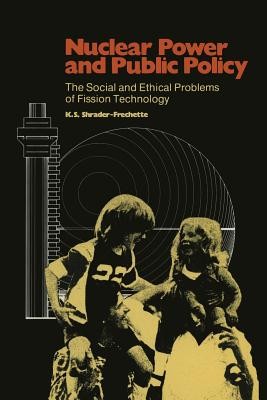
- We will send in 10–14 business days.
- Author: Kristin Shrader-Frechette
- Publisher: Springer
- Year: 1982
- Pages: 198
- ISBN-10: 9027715130
- ISBN-13: 9789027715135
- Format: 15.6 x 23.4 x 1.1 cm, minkšti viršeliai
- Language: English
- SAVE -10% with code: EXTRA
Reviews
Description
This book grew out of projects funded by the Kentucky Human- ities Council in 1974 and. 1975 and by the Environmental Protec- tion Agency in 1976 and 1977. As a result of the generosity of these two agencies, I was able to study the logical, methodological, and ethical assumptions inherent in the decision to utilize nuclear fission for generating electricity. Since both grants gave me the opportunity to survey public policy-making, I discovered that there were critical lacunae in allegedly comprehensive analyses of various energy technologies. Ever since this discovery, one of my goals has been to fill one of these gaps by writing a well-docu- mented study of some neglected social and ethical questions regarding nuclear power. Although many assessments of atomic energy written by en- vironmentalists are highly persuasive, they often also are overly emotive and question-begging. Sometimes they employ what seem to be correct ethical conclusions, but they do so largely in an in- tuitive, rather than a closely-reasoned, manner. On the other hand, books and reports written by nuclear proponents, often Under government contract, almost always ignore the social and ethical aspects of energy decision-making; they focus instead only on a purely scientific assessment of fission generation of electricity. What the energy debate needs, I believe, are more studies which aim at ethical analysis and which avoid unsubstantiated assertions. I hope that these essays are steps in that direction.
EXTRA 10 % discount with code: EXTRA
The promotion ends in 23d.16:14:32
The discount code is valid when purchasing from 10 €. Discounts do not stack.
- Author: Kristin Shrader-Frechette
- Publisher: Springer
- Year: 1982
- Pages: 198
- ISBN-10: 9027715130
- ISBN-13: 9789027715135
- Format: 15.6 x 23.4 x 1.1 cm, minkšti viršeliai
- Language: English English
This book grew out of projects funded by the Kentucky Human- ities Council in 1974 and. 1975 and by the Environmental Protec- tion Agency in 1976 and 1977. As a result of the generosity of these two agencies, I was able to study the logical, methodological, and ethical assumptions inherent in the decision to utilize nuclear fission for generating electricity. Since both grants gave me the opportunity to survey public policy-making, I discovered that there were critical lacunae in allegedly comprehensive analyses of various energy technologies. Ever since this discovery, one of my goals has been to fill one of these gaps by writing a well-docu- mented study of some neglected social and ethical questions regarding nuclear power. Although many assessments of atomic energy written by en- vironmentalists are highly persuasive, they often also are overly emotive and question-begging. Sometimes they employ what seem to be correct ethical conclusions, but they do so largely in an in- tuitive, rather than a closely-reasoned, manner. On the other hand, books and reports written by nuclear proponents, often Under government contract, almost always ignore the social and ethical aspects of energy decision-making; they focus instead only on a purely scientific assessment of fission generation of electricity. What the energy debate needs, I believe, are more studies which aim at ethical analysis and which avoid unsubstantiated assertions. I hope that these essays are steps in that direction.


Reviews